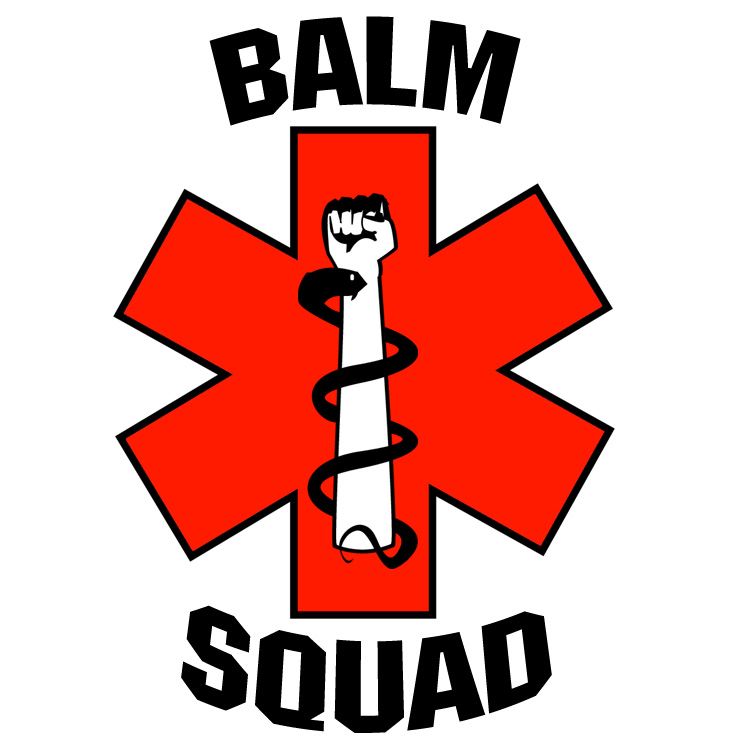
Boston Area Liberation Medic (BALM) Squad
Providing Medical Coverage for Progressive Actions in Boston and Beyond
BALM Squad Home
What Do Street Medics Do?
Training
The BALM Library
Street Medic Links
Medics in the News
Contact Us
For a printer-friendly version of this handout, click here. The handout will display sideways. This is intentional to facilitate double-sided printing. You will need the free Adobe Acrobat Reader to access the printer-friendly version of the handout. To download the latest version of Acrobat Reader for your computer, click here.
SHIT! WE'RE GONNA GET ARRESTED!
Do this now:
- If you have legal support, have the phone number written in indelible ink somewhere on your skin. Have any other numbers you might possibly need written on you, as long as you don't mind the police seeing them.
- Your bag may get taken long before you are searched, so put anything you want to have with you somewhere on your person, particularly ID, medications and money (no need for ID if you're doing jail solidarity). Other things to keep: cell phone (beware of any sensitive numbers in memory), food, extra clothes (protects against cold floors, good pillow), pen, paper. You'll probably get your stuff back, but no guarantees. If you can, consider giving your bag and keys to someone who won't get arrested.
- If you want to get anything past a search, this is the time to hide it. Pens, phones, and meds can fit nicely in the front of your underwear or bra.
If you are put in plastic handcuffs:
- Plastic cuffs have caused some people long-term nerve damage. If you have pain, numbness, or tingling in your hands at any time immediately request that looser cuffs be put on. If one officer refuses, ask another and don't stop asking until they change the cuffs.
- Try not to move around too much, as this can tighten the cuffs.
- Consider requesting that you be cuffed in front. Ask if anyone in your group can demonstrate how to contort yourself so you can get the cuffs in front.
- If after the cuffs are removed you experience pain, numbness or other unpleasant feelings have these symptoms documented ASAP by a medical professional and get in touch with your local street medic organization. Also check out http://action-medical.net/library/aftercare/handcuffs.htm
If you have a medical problem before or during detention:
- If you have a medical condition that could cause problems while you are being held consider telling the police ahead of time. This may encourage them to respond more quickly if you start to have problems.
- If you or anyone in your group starts having a medical problem tell the police ASAP (with the person's consent), and request immediate professional medical attention. Do this early, as it may take a long, long, long time for the police to do anything. If you don't get a response initially keep asking until help arrives. Consider using chanting or other group tactics to get the police to respond.
While you are detained:
- Stay as calm as you can. The police may try to unnerve, dehumanize and stress you out. Try yoga, singing, meditation, sharing stories, etc.
- Remember, police lie. Your fear is their weapon against you. They will tell you things that aren't true (that your friends have blamed you and are getting out, that you'll get out in an hour, etc.).
- Think about what good can come of your arrest. Can you do a skill-share with you cell mates? Learn new songs? Tell jokes?
- If police are abusive in any way (emotional, physical, violating your rights) note the officer's name and badge number. Try to remember as many specific details as you can. If you have a pen, write it all down!
When you get out:
- Release can be paradoxically stressful—suddenly you have to deal with the outside world again.
- Try and talk about your experiences before you go to sleep, ideally with the people you were with. If possible, recount what happened and how you felt about it. If you don't feel comfortable talking, listening to others talk about what happened can help. Research shows that if people sleep before talking about traumatic experiences they have a higher incidence of long-term emotional problems related to the trauma.
- Try and be gentle with yourself. Sleep (after talking), eat healthy food, relax, get friends to give you massages, indulge, BUT avoid alcohol, tobacco and other drugs as much as possible.
- Don't go through this alone! If your regular friends aren't sympathetic, find fellow activists or groups that can help. Some medics are trained in counseling, or you can call the International Critical Incident Stress Hotline at 410 750-9600
- Be creative with stress management - try herbal therapy, counseling, massage, Reiki, etc. See http://www.geocities.com/healingtrauma/index2.html
- Even if you don't feel terribly stressed you may have nightmares, a short temper or other reactions to your experience. This is normal, and may be a sign that you could use more formal processing of the experience.
For more information:
http://www.action-medical.net - general street medic site with good info and links on plastic handcuffs, emotional trauma and other health issues
This document produced by the Boston Area Liberation Medic Squad (BALM Squad)
http://www.bostoncoop.net/balm bostonmedics@riseup.net
This page last updated: 12/18/2002